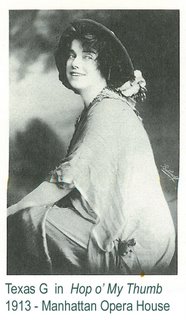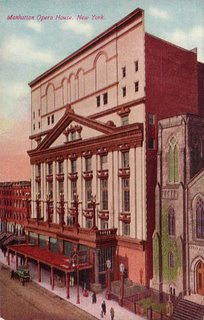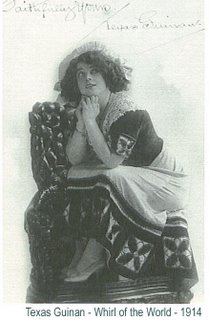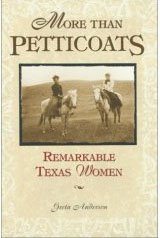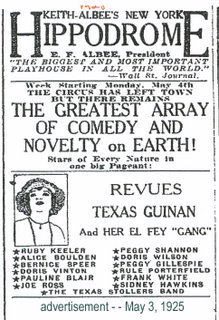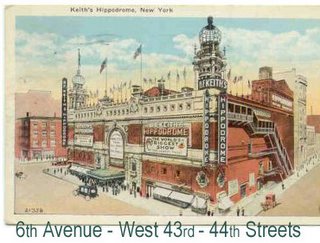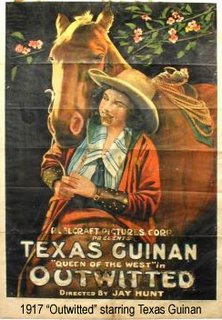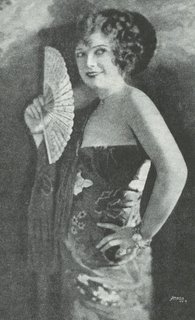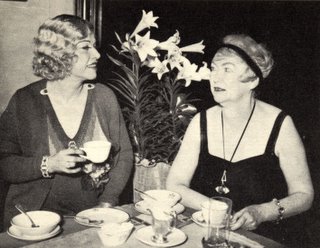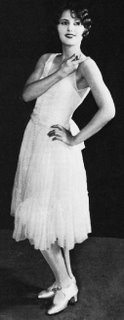Since the movie "Brokeback Mountain" had a stupendous advertising and marketing budget, maybe the studio that released it can bribe its way to an Oscar. Meanwhile, someone ought to thank American author Owen Wister [14 July 1860 - 21 July 1938] for popularizing the taste for exotic cowboy fiction.
• • • • "Smile when you call me that!" - - from
The Virginian • • • •
• • Owen Wister's enduring bestseller - -
The Virginian: A Horseman of the Plains [1902] - - was dedicated to Theodore "
Rough Rider" Roosevelt; later editions carried Frederic Remington's illustrations. The tale of a modest, quiet hero (more comfortable with his horse than with people) gained such a following that it was reprised by Hollywood several times. Wister's novel even spawned a TV series and a Broadway play.
• • In 1914, Cecil B. DeMille directed a silent film starring Dustin Farnum:
The Virginian. A trend was set and an audience yearned for more.
• • In Spring 1919 Texas Guinan made her first feature, a silent called "
South of Santa Fe" co-starring George Cheseboro, and directed by Cliff Smith, who had worked with "gunslinger" Bill Hart. Released by the Frohman Amusement Corporation, and with its footage still available, it's set at the Bar-K Ranch. Ranch owner Mrs. Wendell, married to a good-for-nothing who spends most of his time at Lopez's bar, advertises for a foreman who can manage unruly cowhands.
• • "You can't get a foreman south of Santa Fe that can handle that gang!" says one character.
• • "I'll get one and make all you coyotes hunt your holes!" replies Mrs. Wendell.
• • Mrs. Wendell gets a letter from a foreman who "can make men step around like snakes on a hot stone. Say the word and you've hired me." It's signed J. Kennedy.
• • Jessie Kennedy (Texas Guinan) rides up to Bar-K Ranch and, though the guys don't want to work for a "calico foreman," the film portrays how Jessie actually gains respect and obedience. Thrilling sequences feature frame-ups, bank robberies, and various intrigues. The heroine even conquers the Sheriff by the end, riding off into the sunset with him during the final frame.
• • William Sherrill promoted Texas as a "female Bill Hart" and leased the Chaplin studios in Los Angeles to produce this silent, backed by a strong ad campaign. "Texas Guinan to Typify the West" promised one advertisement.
• • • • The Code of the West • • • •
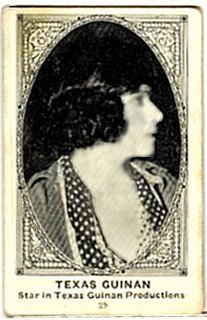
• • By Fall 1921 Texas Guinan had leased the Fine Arts Studio in Hollywood [4500 Sunset Boulevard] and had six sagas planned for the cameras.
• • "
Texas of the Mounted" was the first silent released by her own production company. She used the six-acre studio for the interior footage and shot the outdoor scenes in the San Jacinto Mountains at Camp Keene. Her daring on horseback was praised by critics and applauded in the trade papers, too.
• • Were they there in November 1918 for the celebration of Armistice Day on Fifth Avenue when
Texas Guinan rode an elephant [betw 36th Street - 39th Street]? Hey, cap that feat, Madonna, when you try to impersonate Texas Guinan onscreen in "
Hello, Suckers!" - - yeah, we're waiting.
• • In November 1921 Texas released "
The Code of the West," co-starring with the British actor David E. Townsend.
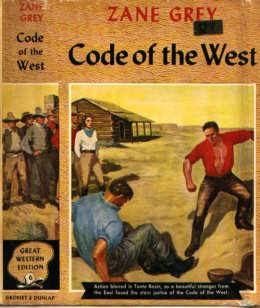
_________________________________________________
• • The Code of the West fascinated Zane Grey [31 January 1872 - 23 October 1939], the Western writer who died in 1939 at age 67, who also shaped the way the world perceived the "Old West." Very likely, it was Zane Grey’s enormous output - - 57 novels, 10 books of Western nonfiction, and 130 movies - - that helped to continue creating the mythology of the West.
The Code of the West by Zane Grey was published in 1934.
• • There was a Code of the West, and Ramon Adams, a Western historian, elaborated in his book:
The Cowman and His Code of Ethics [1969].
• • According to Ramon Adams: Back in the days when the cowman with his herds made a new frontier, there was no law on the range. Lack of written law made it necessary for him to frame some of his own, thus developing a rule of behavior which became known as the "Code of the West." These homespun laws, being merely a gentleman’s agreement to certain rules of conduct for survival, were never written into statutes, but were respected everywhere on the range.
• • Ramon Adams wrote: "When legislated laws did come to the frontier, they failed to meet the needs and conditions on this fringe of civilization. Men did not respect them because they could not obey them and survive. Thus the West gained a reputation for being lawless - - though the blame for this condition should have been placed upon the white-collared law-makers, not upon the so-called law-breakers."
• • Texas Guinan:
lawless? Let's hear your opinion about "The Lawless Decade" that she featured in so prominently.
_________________________________________________________
Source:http://texasguinan.blogspot.com/atom.xml
 Texas Guinan
Texas Guinan• • photo: Texas Guinan [1921] •
The Code of the West by Zane Grey [1934] •
NYCTexas Guinan.

